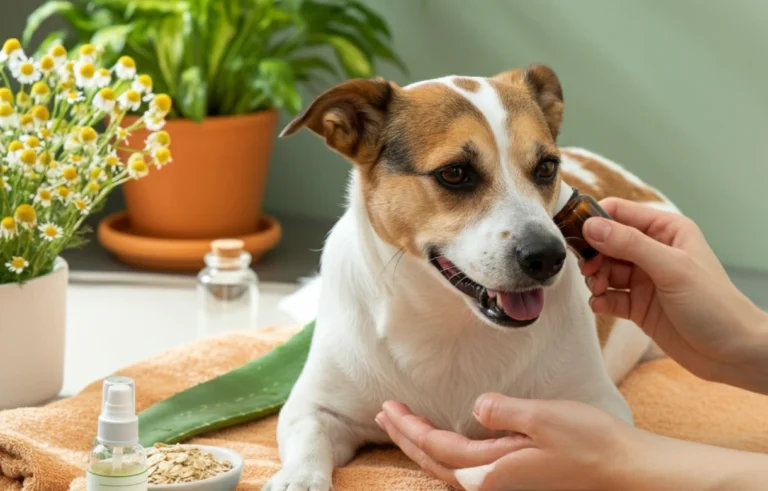It can be distressing to watch your canine companion constantly scratching, licking, or chewing their skin. An itchy dog is an uncomfortable dog, and as a pet parent, you want to provide relief as quickly as possible. While persistent or severe itching always warrants a trip to the veterinarian, many pet owners look for safe, complementary options to use at home. This guide explores several popular and effective natural remedies for dog itching that can help soothe your furry friend’s discomfort.
Before trying any new treatment, it’s crucial to understand what might be causing the problem. Itching, also known as pruritus, is a symptom, not a disease. Identifying the root cause is the most important step toward finding a lasting solution. Consulting with your veterinarian is the best way to get an accurate diagnosis and ensure you are providing the right care for your pet’s specific needs. For more insights on dog skin health, you might find the American Kennel Club’s guide to itchy dogs helpful.
Why Is My Dog So Itchy? Understanding the Common Causes
A common theme in veterinary advice and online resources is to first pinpoint the source of the itch. Without addressing the underlying issue, any relief you provide might only be temporary. Several factors can lead to itchy skin in dogs.
Allergies: A Primary Culprit
One of the most frequent reasons for persistent itching is allergies. Just like humans, dogs can be allergic to a variety of substances.
- Environmental Allergies: Pollen, mold spores, dust mites, and grass are common culprits. This type of allergy, known as atopy, often causes itchiness around the paws, face, ears, and belly.
- Flea Allergy Dermatitis (FAD): This is an allergic reaction to flea saliva. For a sensitive dog, a single flea bite can trigger intense itching and skin inflammation that lasts for days.
- Food Allergies: Some dogs develop allergies to certain ingredients in their food, most commonly protein sources like chicken, beef, or dairy. This can cause itchy skin, ear infections, and gastrointestinal issues.
Parasites Beyond Fleas
Fleas are notorious for causing itchiness, but other tiny critters can be responsible too. Mites, such as those causing sarcoptic mange (scabies) or demodectic mange, can lead to severe skin irritation and hair loss. Ticks and lice can also cause localized itching at the bite site.
Dry Skin
Environmental factors can play a significant role in your dog’s skin health. Low humidity, especially during winter months, can lead to dry, flaky, and itchy skin. Certain shampoos can also strip natural oils, exacerbating the problem. Using natural remedies for dog itching can often help restore moisture to the skin.
Skin Infections
Bacterial or yeast infections can cause significant discomfort and itching. These infections are often secondary to another problem, like allergies or a cut. A dog’s constant scratching can break the skin, creating an entry point for bacteria and yeast, leading to a vicious cycle of itching and infection.
Important Disclaimer: Always Consult Your Veterinarian First
While this article discusses many natural remedies for dog itching, it is not a substitute for professional veterinary care. The information provided is for educational purposes only. Before starting any new treatment, diet change, or supplement, you must consult with your veterinarian. They can properly diagnose the cause of your dog’s itching and recommend the safest and most effective course of action. Some natural ingredients can be harmful if used incorrectly or if your dog has an underlying health condition.
Soothing Solutions: 10 Natural Remedies for Dog Itching
Once you’ve worked with your vet to rule out serious conditions, you can explore some at-home options to provide comfort. Many common household items and supplements are frequently recommended online for their soothing properties.
1. Oatmeal Baths
An oatmeal bath is a classic and widely suggested remedy for irritated skin. Colloidal oatmeal has anti-inflammatory properties that can calm redness and reduce itching.
- How to Prepare: Grind plain, unflavored oatmeal into a fine powder using a blender or coffee grinder. The powder should be fine enough to dissolve in water. Stir a generous cup of the powder into a tub of lukewarm water.
- How to Use: Let your dog soak in the oatmeal bath for 10 to 15 minutes. You can also gently pour the water over their body, focusing on the itchiest areas. Rinse your dog thoroughly with clean water afterward to prevent the oatmeal from clumping in their fur.
2. Apple Cider Vinegar (ACV)
Apple cider vinegar has natural antibacterial and antifungal properties, making it a popular choice for skin issues. However, it’s crucial to use it correctly.
- Important Note: Never apply ACV to raw, open, or broken skin, as it will sting and cause pain.
- How to Use: Create a solution of 50% raw, unfiltered apple cider vinegar and 50% water. Put the mixture in a spray bottle. You can spritz it directly onto your dog’s itchy spots. It can be particularly useful for hot spots or itchy paws. This is one of the most accessible natural remedies for dog itching.
3. Coconut Oil
Organic, virgin coconut oil is another versatile remedy. It can moisturize dry skin and has antimicrobial properties.
- Topical Application: You can apply a small amount of coconut oil directly to your dog’s skin, massaging it into the affected areas. It can help soothe dry patches, cracked paws, and minor irritations.
- Dietary Supplement: Adding a small amount of coconut oil to your dog’s food (after consulting your vet on the proper dosage) may help improve their skin and coat from the inside out. Start with a very small dose to avoid digestive upset.
4. Chamomile and Green Tea Soaks
Both chamomile and green tea contain properties that can cool and calm irritated skin. They are gentle and can be used for a soothing soak.
- How to Prepare: Brew several tea bags in a tub of lukewarm water. Remove the tea bags and let the water cool to a safe temperature.
- How to Use: You can have your dog soak in the tea bath for about five minutes. Alternatively, you can use the cooled tea as a spot treatment by applying it with a cloth to itchy areas. This can be a very gentle approach when looking for natural remedies for dog itching.
5. Baking Soda Paste
Baking soda can help dry out skin rashes and relieve itching. It is simple to use and readily available.
- How to Make a Paste: Mix 50% baking soda with 50% water to form a thick paste.
- How to Apply: Apply the paste to your dog’s itchy skin. Let it sit for about 20 minutes before rinsing it off completely. You can also add some baking soda to their bathwater for a soothing soak.
6. Aloe Vera
Aloe vera is well-known for its healing and soothing properties. When choosing an aloe vera product, make sure it is 100% pure. Many commercial gels contain alcohol or other additives that can be irritating or toxic to dogs if licked. The best source is directly from an aloe plant, but avoid the outer latex layer, which can be a gut irritant. This is a great topical choice among natural remedies for dog itching.
7. A Balanced, High-Quality Diet
What your dog eats has a profound impact on their skin and coat health. A diet lacking in essential fatty acids can contribute to dry, dull fur and itchy skin.
- Omega-3 Fatty Acids: Foods rich in omega-3s, such as fish oil (from salmon or sardines), can help reduce inflammation and support the skin barrier. Discuss adding a fish oil supplement with your veterinarian.
- Hypoallergenic Diets: If a food allergy is suspected, your vet may recommend an elimination diet or a prescription hypoallergenic food to identify the trigger ingredient. A proper diet is a fundamental part of managing skin health.
8. Witch Hazel
Witch hazel is a natural astringent that can help reduce inflammation and dry out hot spots. Be sure to use a version that is free of alcohol, as alcohol can sting and dry out the skin further. Apply it with a cotton ball to the affected areas.
9. Vitamin E Oil
Vitamin E is a powerful antioxidant that can help soothe dry, itchy skin. You can purchase Vitamin E oil capsules, break one open, and apply the oil directly to your dog’s dry patches or hot spots. As a dietary supplement, it should only be given under veterinary supervision.
10. Managing Environmental Triggers
Sometimes, the best solution is to remove the source of the problem. If your dog suffers from environmental allergies, proactive management can make a huge difference.
- Wipe Down Paws: After walks, wipe your dog’s paws and belly with a damp cloth to remove pollen and other allergens.
- Regular Bathing: Bathing your dog regularly with a hypoallergenic shampoo can wash away allergens from their coat.
- Clean Bedding: Wash your dog’s bedding frequently in hot water to eliminate dust mites and other potential irritants.
When Do Natural Remedies for Dog Itching Not Work?
While these natural remedies for dog itching can provide significant relief for mild cases, they are not a cure-all. It is essential to monitor your dog’s condition closely. If the itching persists, worsens, or is accompanied by any of the following symptoms, you should seek veterinary attention immediately:
- Open sores, scabs, or bleeding
- Hair loss
- An unpleasant odor from the skin
- Changes in behavior, such as lethargy or loss of appetite
- Signs of a severe allergic reaction, like swelling of the face or difficulty breathing
- Constant, frantic scratching that you cannot interrupt
Your veterinarian can perform diagnostic tests to determine the exact cause and prescribe necessary medications, such as antihistamines, steroids, or antibiotics, to get the situation under control.
Frequently Asked Questions (FAQ)
Q1: How often can I give my dog an oatmeal bath?
For general soothing, an oatmeal bath once or twice a month is usually sufficient. If your dog has a specific flare-up, your vet may recommend more frequent bathing. Always rinse thoroughly.
Q2: Is it safe for my dog to lick coconut oil off their skin?
In small quantities, pure coconut oil is generally safe for dogs to ingest. However, excessive consumption can lead to diarrhea or greasy stools. Apply a thin layer and try to distract your dog for a few minutes to let it absorb.
Q3: Can I use human anti-itch creams on my dog?
No. You should never use human medications on your dog without explicit instructions from your veterinarian. Many human products contain ingredients that are toxic to dogs, such as certain steroids or zinc oxide.
Q4: What is the best way to introduce natural remedies for dog itching?
Start with a small patch test on your dog’s skin to ensure they don’t have an adverse reaction. Introduce one new remedy at a time so you can clearly identify what works and what doesn’t. And always, consult your vet first.
Q5: Why is my dog still itching after flea treatment?
If your dog has Flea Allergy Dermatitis (FAD), the itching can continue for days or weeks after the fleas are gone. It’s also possible that fleas are still present in the environment (your home or yard). Consistent, year-round flea prevention for all pets in the household is key.
Finding the right combination of natural remedies for dog itching and professional veterinary care can bring lasting comfort to your beloved pet. By being a proactive and observant owner, you can help your dog live a happier, healthier, and much less itchy life.
You can aslo read “how to take care a pet?“


